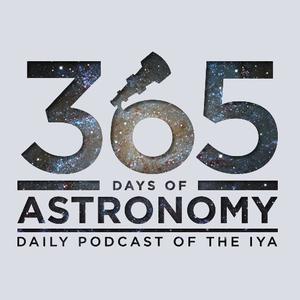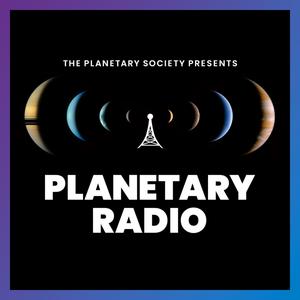
Walkabout the Galaxy
Joshua Colwell, Adrienne Dove, and James Cooney
- 39 minutes 22 secondsMysterious Dark Comets
We know about extinct comets and active asteroids, but now we've got something in between: dark comets, whose orbits indicate cometary activity, but we can't see it! We'll get the scoop on these interesting objects, a flare from a supermassive black hole, and a twist on the question of the age of Saturn's rings. Plus, we have our end-of-the-year rocket launch roundup, and a special astrophysical FLOD stumper for top quark Jim Cooney.
18 December 2024, 11:00 am - 37 minutes 48 secondsMaking Big Blobs is Hard
Top quark Jim Cooney explains why making big blobs is hard and how new observations are helping us understand how the universe made big immensely big blobs more commonly known as giant elliptical galaxies. Nature loves to make a disk, and we love to tell you all about the cool things nature does, including a solid state greenhouse on ancient Mars that may have produced a huge buried supply of water to create giant rivers near its south pole. Join us for this and more mind-blowing stuff. It's all part of our Walkabout the Galaxy.
11 December 2024, 11:00 am - 43 minutes 44 secondsNeutrino Fog and the Hunt for Dark Matter
It's a good news bad news story with the detection of the neutrino fog. This signal from solar neutrinos may confound our search for certain dark matter candidates, but at least we know our detectors are very, very sensitive! We also take a look at magnetic fields in the outer solar system, specifically why Uranus's magnetosphere was so weird when we visited in 1986, and what tiny grains from a near Earth asteroid may be telling us about the magnetic field four and a half billion years ago. Join us for all that, and of course space news and stupid trivia.
27 November 2024, 11:00 am - 41 minutes 34 secondsNot All Supernovae Are Created Equal
If you're speaking English, not Latin, do you really have to say "supernovae" instead of "supernovas"? Also, they are, in some sense, created equally: explosion of a white dwarf, but the outcomes are not all equal. You are welcome for this grammatical tangent, and please enjoy our fun discussion about weird tesserae (more Latin!) on Venus and the whole standard candle story of type 1a supernovae gets a rewrite. On this episode of Walkabout the Galaxy, you can also enjoy solar energy/spacecraft trivia, space news, and general hilarity at no extra charge.
20 November 2024, 11:00 am - 42 minutes 2 secondsIs There Another Belt of Comets?
New observations contradict earlier studies about the possibility of another belt of comets orbiting the Sun twice as far away as Pluto. We'll take a look at what's what in the outer solar system and also explore whether black holes may help explain the Hubble tension. We also play FLOD (Flyby, Land, Orbit, Destroy) and have some "how many planets" trivia.
6 November 2024, 10:00 am - 28 minutes 14 secondsTrojan Asteroids Everywhere
Join Strange and Down quarks for a close look at Trojan asteroids, the forgotten asteroids of the solar system. NASA's Lucy mission is en route to take our first close look at these denizens of the outer solar system and has an Earth gravity assist in December 2024. As you'll see in our trivia, the numbers of Trojans may surprise you. Jupiter is the king of the Trojans, but we'll take a closer look at the first comfirmed Trojan of Saturn.
30 October 2024, 4:29 am - 45 minutes 9 secondsBasin Instinct - Cosmological Structure and Edible Asteroids
We get a tour of our place in the grand cosmological scheme of things with new mapping of the local Basin of Attraction. Spoiler: also Jim's new stage name. And we explore the final frontier of In Situ Resource Utilization with studies of how to get edible nutrients from the raw materials in asteroids. It's a little bit gross. Plus space news, trivia, and more. Join us to learn about all this (and all of our new stage names).
23 October 2024, 10:00 am - 50 minutes 24 secondsOG Top Goes to Europa
Original Top Quark Dr. Tracy Becker returns to her old stomping grounds to hang with the Walkabout crew and send Europa Clipper on its way to Jupiter. Join us for a preview of this mission's ambitious goals and the exciting journey it took to the launch pad. Also, new research suggests the Earth may escape a fiery death when the Sun becomes a red giant. We have, of course, space news, space history trivia, and much more.
9 October 2024, 10:00 am - 47 minutes 58 secondsBack in Black Holes
We’ve got mini black holes as potential dark matter candidates and monstrous black holes spewing jets to cosmological scales. Who better than Top quark Jim Cooney to take us through these black holes? No one, that’s who. We take a deep dive into meteorites, particularly those that have come from Mars. You may be surprised to learn how many we have, and now we know more about where those free Mars samples originated from on the red planet. Join us for all this, space news, and trivia.
2 October 2024, 10:00 am - 41 minutes 3 secondsBlack Hole Spindown Chirp and a 9-Day Geologic Rumble
Gravitational waves may provide a new way to observe supernovae in our own Milky Way galaxy and determine when they produce black holes and when they result merely in neutron stars. Closer to home, scientists did some clever detective work to figure out the source of a mysterious 9-day seismic shaking here on Earth. The culprit: a giant, regular sloshing in a fjord triggered by a landslide as a result of warming temperatures and melting land ice. Join us for this and other astro news including an interesting mini-moon and funny science lingo.
18 September 2024, 10:00 am - 46 minutes 1 secondRecent Lunar Volcanic Activity and the Metallicity Cliff
Tiny samples brought back from the Moon hint at surprisingly recent volcanic activity. What's up with that?! Elsewhere in the galaxy, a detailed study of over 100,000 stars identifies the metallicity cliff. This is where stellar composition that is low in heavy elements seems to inhibit the formation of at least some types of exoplanets. The astroquarks have all the details for you, as well as a Polaris Dawn update and nerd trivia. Join us, won't you?
11 September 2024, 10:00 am - More Episodes? Get the App
Your feedback is valuable to us. Should you encounter any bugs, glitches, lack of functionality or other problems, please email us on [email protected] or join Moon.FM Telegram Group where you can talk directly to the dev team who are happy to answer any queries.
 Are We There Yet?
Are We There Yet?
 Main Engine Cut Off
Main Engine Cut Off
 Astronomy Cast
Astronomy Cast
 The 365 Days of Astronomy
The 365 Days of Astronomy
 Universe Today Podcast
Universe Today Podcast
 Planetary Radio: Space Exploration, Astronomy and Science
Planetary Radio: Space Exploration, Astronomy and Science